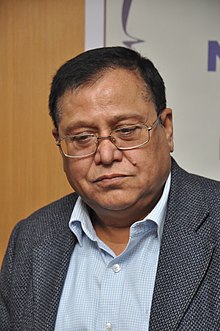V. K. Saraswat
Vijay Kumar Saraswat | |
|---|---|
 | |
| Born | 25 May 1949 |
| Nationality | Indian |
| Alma mater | |
| Occupation | Former Chancellor of JNU |
| Years active | 1972 – present |
| Notable credit | Prithvi Missile |
| Awards | |
Vijay Kumar Saraswat is an Indian scientist who formerly served as the Director General of the Defence Research and Development Organisation (DRDO) and the Chief Scientific Advisor to the Indian Minister of Defence.[2] He retired as the Director General of the DRDO on 31 May 2013.[3] Saraswat is presently a member of NITI Aayog, the Indian Government's apex public policy think tank[4] and the President of Sree Chitra Tirunal Institute for Medical Sciences and Technology, Trivandrum.[5] Saraswat is also a former Chancellor of Jawaharlal Nehru University.[6]
Saraswat is the key scientist in the development of the Prithvi missile and its induction in the Indian armed forces. He is a recipient of the Padma Shri and Padma Bhushan from the Government of India.
Early life
[edit]Born on 25 May 1949 in Danaoli locality in Gwalior, Saraswat completed his Bachelors in Engineering from Madhav Institute of Technology and Science Gwalior, M.P. He earned a Master of Engineering degree from Indian Institute of Science (IISc) followed by a Doctorate in Propulsion Engineering from Osmania University.[7]
Honors
[edit]Saraswat is fellow of National Academy of Engineering, Aeronautical Society of India, Astronautical Society of India, and Institution of Engineers. He is a member of governing council of SAMEER and member of Board of Research of AICTE, CSIR labs, and board of studies of Osmania University. He is chairman, Combustion Institute (Indian Section), and Aeronautical Society of India (Hyderabad Branch). Dr. Saraswat is a forerunner in the development of number of critical missile technologies that were under denial due to the Missile Technology Control Regime, thus making India self-reliant in Missile Technologies. He has headed various committees of national importance.
Saraswat is the recipient of DRDO Scientist of the Year Award – 1987, National Aeronautical Prize – 1993, DRDO Technology Transfer Award – 1996 and Performance Excellence Award – 1999. For his outstanding contributions to the Nation, he has been conferred with Padma Shri in 1998[8] and Padma Bhusan in 2013.[citation needed] In January 2010 & December 2012 he was awarded with honorary doctorate from Sardar Vallabhbhai National Institute of Technology, Surat, SRM Institute of Science and Technology Chennai and Jawaharlal Nehru Technological University, Hyderabad respectively. He received the Aryabhata Award in 2011.[9]
Issues and controversies
[edit]After internal audit reports and CAG raising red flags over many of V. K. Saraswat's decisions, the Ministry of Defence[10] decided to impose severe restrictions on his financial powers.[11] Government of India in 2013 turned down his extension as DRDO's Chief.[12]
References
[edit]- ^ "Dr VK Saraswat". AeSI. Retrieved 2 July 2012.
- ^ Ganesh (28 August 2009). "Dr VK Saraswat to take over as DG of DRDO and SA to Defence Minister". machinist.in. Retrieved 2 January 2011.
- ^ "Saraswat retires as DRDO chief". Deccan Herald. 13 May 2013. Retrieved 13 May 2013.
- ^ "| NITI Aayog".
- ^ "SCTIMST Governing Body".
- ^ "Jawaharlal Nehru University Chancellor". Archived from the original on 19 January 2016. Retrieved 22 January 2016.
- ^ "| NITI Aayog".
- ^ "Padma Shri Awardees". india.gov.in. Retrieved 2 January 2011.
- ^ "DRDO Chief gets prestigious Aryabhatta award". The Economic Times. 28 May 2013.
- ^ "The secret world of DRDO". The New Indian Express. Archived from the original on 4 September 2012. Retrieved 25 September 2014.
- ^ "Ministry of Defence restricts DRDO chief's fiscal powers". The Times of India. Retrieved 25 September 2014.
- ^ "Govt not to extend DRDO chief's tenure". The Times of India. Retrieved 25 September 2014.
| Aeronautics |
| ||||||||||||
|---|---|---|---|---|---|---|---|---|---|---|---|---|---|
| Armaments |
| ||||||||||||
| Armoured fighting vehicles |
| ||||||||||||
| Electronics, computer science |
| ||||||||||||
| Missile systems | |||||||||||||
| Bombs |
| ||||||||||||
| People |
| ||||||||||||
| Engines | |||||||||||||
| Important programmes | |||||||||||||
Padma Bhushan award recipients (2010–2019) | |
|---|---|
| 2010 |
|
| 2011 |
|
| 2012 |
|
| 2013 |
|
| 2014 |
|
| 2015 |
|
| 2016 |
|
| 2017 | |
| 2018 | |
| 2019 | |
Text is available under the CC BY-SA 4.0 license; additional terms may apply.
Images, videos and audio are available under their respective licenses.
